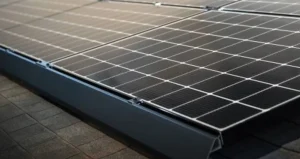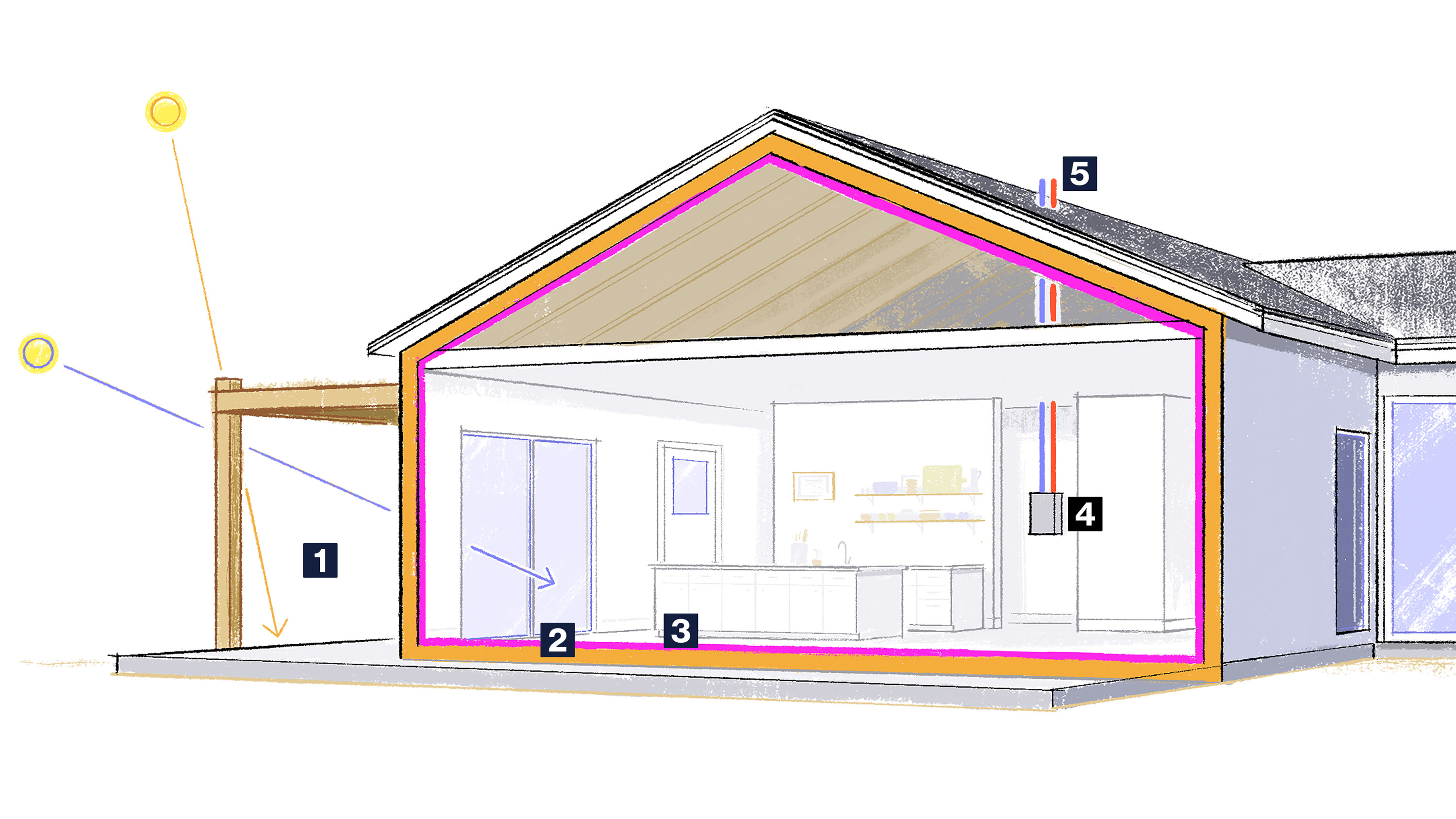Solar panels do not make your house hotter; they can actually provide shade and help cooling. Their installation might even result in reducing the heat transferred to your home.
The question of whether solar panels increase a home’s temperature floats in the minds of many prospective solar users. Contrary to some assumptions, solar panels can have a cooling effect on your house. These energy-harnessing devices are placed on rooftops where they absorb sunlight before it reaches the roofing material, leading to less direct heat on your house.
They act as a barrier, keeping roof surfaces and attic spaces cooler, which can lead to a decrease in your cooling costs during hot seasons. This beneficial aspect adds to the appeal of solar panels as they not only contribute to environmental sustainability but also enhance home comfort.
Opting for solar panel installation may be a strategic decision for energy savings and possibly a cooler home environment.
Myth-busting Solar Panel Temperature Concerns
The belief that solar panels increase roof temperature is common. Solar panels actually work by absorbing sunlight. But, they convert most of this energy into electricity, not heat. The air gap between the panel and the roof helps too. It allows air to flow, which reduces heat transfer to the structure below.
This air space is due to solar panel design. It is crucial for cooling purposes. So, panels are made to capture light but minimize heat impact. Your roof may actually stay cooler in some areas. This is because the panels block direct sunlight from hitting the roof’s surface.
Shading effect from the panels also plays a part. It is similar to how a tree’s shade can cool your home’s exterior. To conclude, solar panels do not make houses hotter. They may help in keeping them cooler!
Learn More: Powering Your Electric Heater with Sunlight: Is it Possible?
How Solar Panels Interact With Sunlight
Solar panels might seem like they would heat up your home, but that’s not quite true. They absorb sunlight and convert it into electricity. This process is known as photovoltaic conversion. The panels take in photons and produce energy, leaving less heat to reach your roof. It’s like having a shade over your house.
The panels themselves can get hot. But don’t worry, they are designed to withstand high temperatures. They also have a layer of air between the panel and the roof. This helps to keep the roof cooler than if it was hit by direct sunlight. So, solar panels can actually lower your home’s temperature during those sunny days, and not make it hotter.

Insulation Effect: How Solar Panels Affect Home Temperature
Solar panels may actually cool your home. Many think solar installations increase temperatures. The truth is different. Solar panels provide shade on your roof. This blocks the sun’s intense heat. Underneath the panels, air can flow. This helps to remove excess heat. The effect resembles putting a hat on in the summer.
Studies support the cooling effect. Data shows that solar homes often stay cooler. In these homes, panels act as a protective layer. The space between the roof and the panels allows heat to escape. Your home could be cooler with solar panels.
| Location | Temperature With Panels | Temperature Without Panels |
|---|---|---|
| California | 68°F | 73°F |
| Florida | 72°F | 76°F |
| Texas | 70°F | 74°F |

Climate Considerations For Solar Panels
Solar panels may seem like they could increase your house’s temperature, but that’s not quite accurate. Solar panels actually shield your roof from direct sunlight, which can lead to a reduction in heat entering your home. The climate plays a significant role in solar panel efficiency. Mild climates with ample sunlight are ideal for solar panels, as extreme temperatures can affect their operation.
During winter months, shorter days and snow can reduce solar energy production. Conversely, in summer, longer days increase potential solar energy but high heat might slightly decrease efficiency. Yet, solar panels are designed to withstand these seasonal changes. Many modern solar systems come equipped with cooling mechanisms to mitigate the impact of high temperatures, ensuring that your house stays cooler despite the natural variances.
Maximizing Comfort While Harnessing Solar Energy
Proper landscaping and shading are key to keeping your house cool with solar panels. Planting trees strategically can create natural shade, significantly reducing the heat that hits your home. Specifically, consider placing trees or large shrubs on the sunniest side of your house. Doing so can block some of the direct sunlight, which in turn, helps to keep the interior of your home cooler during peak hours.
Utilizing shading devices like awnings or sunshades over your windows can also be beneficial. These serve as a barrier against the sun’s rays, preventing excessive heat build-up. By implementing these strategies, you’ll enhance comfort levels within your home while still enjoying the benefits of solar energy.
Read more: Are Solar Generators a Smart Investment? Evaluating Their Worth in Today’s Energy Market
Real Feedback From Homeowners With Solar Panels
Homeowners with solar panels often notice no significant increase in their home’s temperature. One solar panel user shared, “My house stays cool, even in summer.” Their panels absorb sunlight which might otherwise heat the roof. Another resident remarked, “Rooms feel the same as before installation.” This implies that solar panels do not affect indoor temperatures markedly.
Over time, families with rooftop panels don’t link them to higher heat inside. “I’ve seen no change in my cooling costs,” noted a homeowner after a year. This indicates that solar panels might actually shield and cool the roof rather than make it hotter. Feedback over years supports the understanding that solar panels have a neutral impact on home heat levels.
Conclusion
Wrapping up, the concern that solar panels increase house temperatures is unfounded. They actually shield your roof, leading to a cooler home interior. As we’ve explored, embracing solar technology can reduce energy costs without compromising your comfort. Considering solar panels?
Fear not—your living space is set to remain your cool, serene haven.
Read More: Does Ring Solar Panel Need Direct Sunlight?